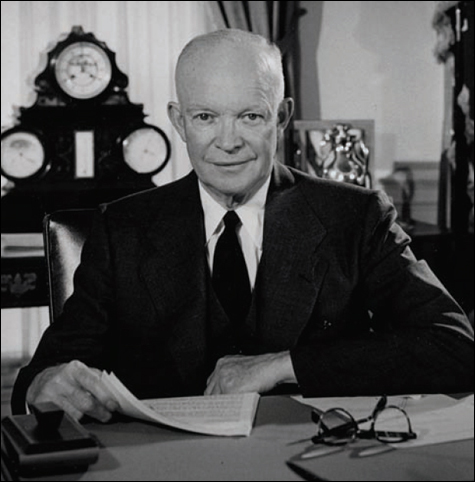
PRESCIENT Eisenhower. |
Action Speaks!, the panel discussion series at Providence art space AS220, kicks off its fall program next week. The theme for the coming months — "Conflict and Amusement in America: How Can It Hurt If It's So Much Fun?"
The series, moderated by Marc Levitt, focuses on underappreciated dates in history. First up: a look at President Dwight D. Eisenhower's farewell speech warning about the rise of a "military-industrial complex."
The panel, free and open to the public, is on October 5 at 5:30 pm. Scheduled speakers include Francis J. "Bing" West, author and former assistant secretary of defense for international security affairs in the Reagan Administration; Neta Crawford, professor of political science and African-American studies at Boston University; and Roger Stahl, an associate professor of communications at the University of Georgia and author of Militainment Inc.: War, Media, and Popular Culture.
The Phoenix, a sponsor of Action Speaks!, caught up with Stahl for a Q&A over email. The interview is edited and condensed.
EISENHOWER'S WARNING ABOUT THE RISE OF A "MILITARY-INDUSTRIAL COMPLEX" HAS ENDURED FOR MANY REASONS — HIS STATURE AS A MILITARY INSIDER AND THE PRESCIENCE OF HIS WARNING, AMONG THEM. BUT I'M WONDERING IF YOU COULD SPEAK TO THE RHETORIC ITSELF. WHAT IS SO COMPELLING ABOUT HIS SPEECH? This was a relatively dramatic moment in presidential rhetoric. At the time, Eisenhower represented the last person who might utter these words, what one might call a "reluctant witness." A farewell address, moreover, is often viewed as an authentic moment of truth relatively free of institutional constraints. Finally, Eisenhower's description of the "unwarranted influence" that could potentially permeate every level of government provided a powerful and ominous vision of democracy under threat. The term "military-industrial complex" would not make its full presence felt, however, until the closing stages of the US intervention in Vietnam. If one simply looks at the library shelves, the greatest concentration of books featuring the term appear in the early 1970s and the mid 2000s, during periods of intense opposition to foreign policy. As such, the term has been used mainly by peace groups as a rallying cry and shorthand for a particular kind of political analysis. The analysis holds that war is not waged for defense, but rather because it is profitable for arms manufacturers.
WAR HAS BEEN A FORM OF ENTERTAINMENT FOR A LONG TIME. BUT YOUR BOOKMILITAINMENT SUGGESTS WE'VE ENTERED NEW TERRITORY WITH INTERACTIVE MEDIA — VIDEO GAMES, REALITY TELEVISION, AND THE LIKE. WHY IS THIS SIGNIFICANT? The 1991 Gulf War was a turning point in the presentation of war to the US public. Here, the entertainment industries and government PR consolidated a range of profitable partnerships. This resulted in programming that both attracted audiences and stayed "on message." In short, the war was produced as must-see TV, cheered like Top Gun, and merchandized like Star Wars. Following 9/11, interactivity became the model for the military-media relationship. During this period, the public was invited not simply to watch but to play soldier, whether it was through the explosion of war-themed video games or the image of the embedded reporter. The rise of this interactive urge is significant. Rather than turning off the urge to deliberate (as one might turn down the movie house lights), interactive militainment channeled the participatory urge into fantasies that harmonized with official policy: the fantasy of what it's like to carry out orders.